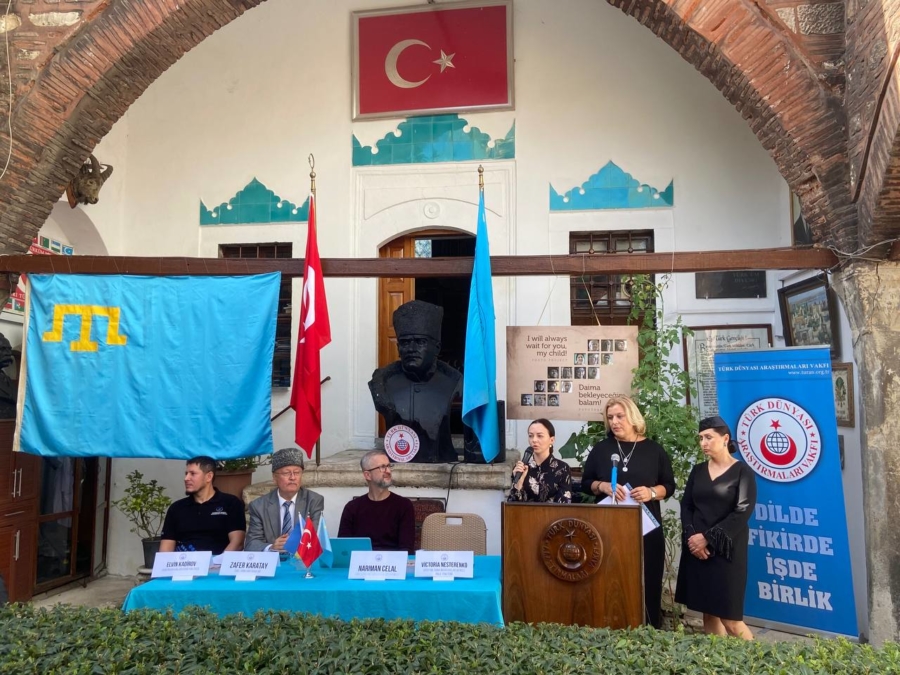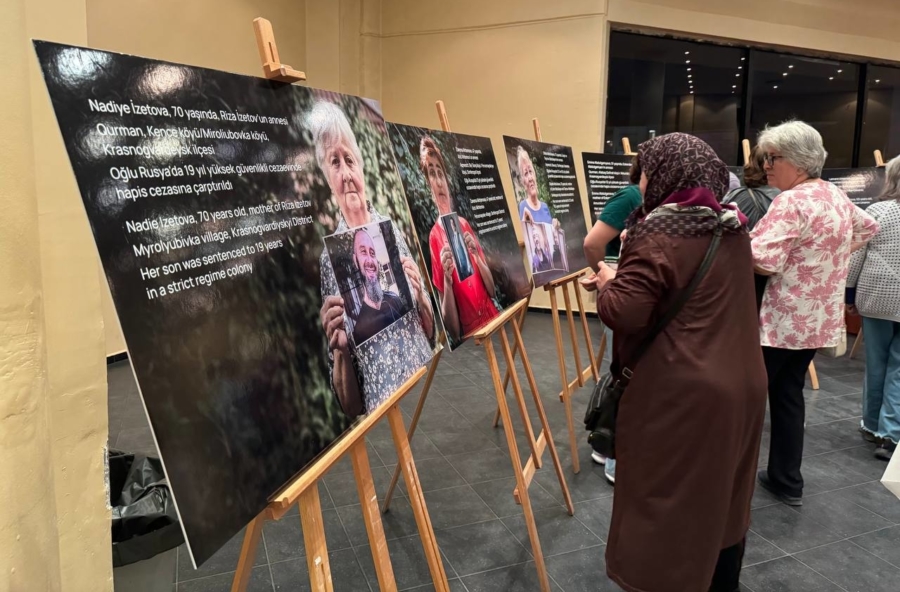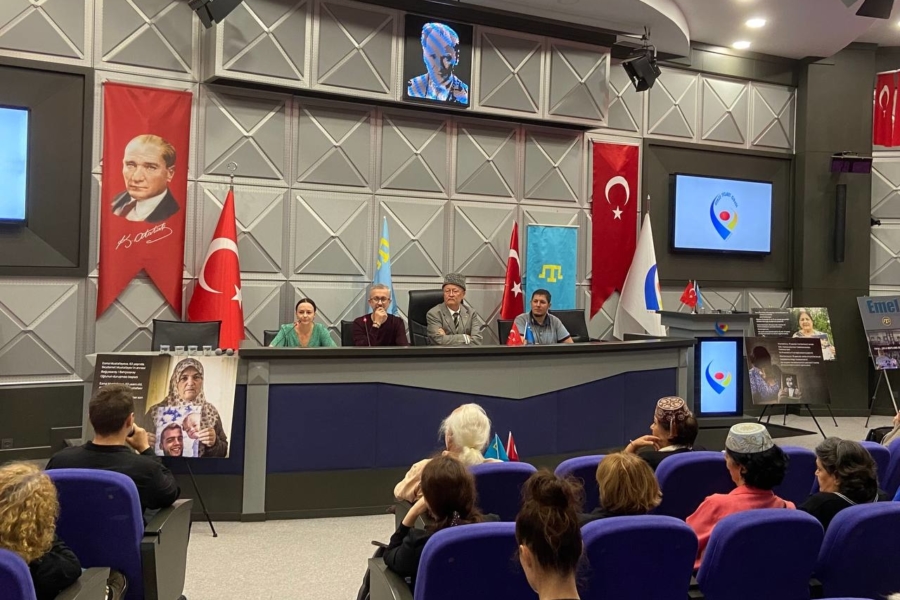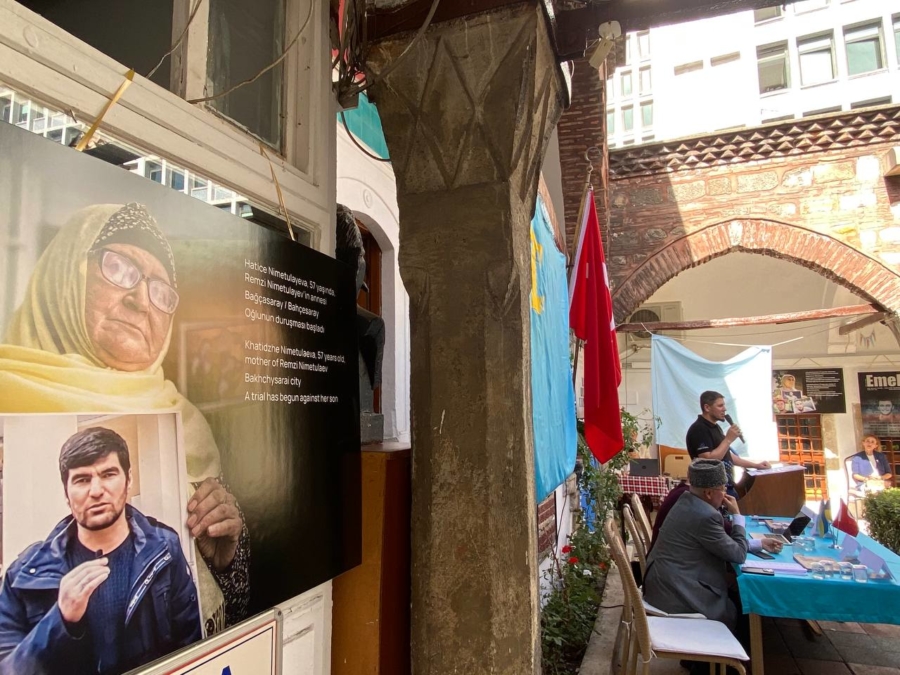ZMINA told the stories of mothers of Crimean political prisoners in Türkiye
Representatives of the Human Rights Centre ZMINA in cooperation with the Office of the Ombudsman of Ukraine, the Embassy of Ukraine in Türkiye and the Crimean Tatar diaspora, in particular Emel Kırım Vakfı, held a series of exhibitions “I will always wait for you, my child!” in Türkiye with the support of the Ministry of Foreign Affairs of the Czech Republic. The heads of regional administrations of Türkiye, the Crimean Tatar diaspora, public figures and activists were present at the exhibitions.

Residents of Istanbul, Eskişehir, Ankara and Gebze had the opportunity to see the photo exhibition “I will always wait for you, my child!“, which was designed to tell about women whose hearts were broken, health undermined and peace taken away due to the Russian occupation of Crimea. Each woman depicted in the exhibition is the mother of a political prisoner whose life was halted when her child was taken away by Russian-controlled security forces.
“We want to be the voice of these women, and we want this voice to be heard not only in Ukraine but also abroad. We want to call on everyone to support the families of political prisoners, not to forget what is happening in the occupation. But it is especially important to write letters to those who are in prison because our support is very important to them. The more we talk about what is happening in the occupation and the pain of the families of political prisoners, the more chances the world will hear us and these people will be free,” said ZMİNA Project Manager Viktoria Nesterenko at the opening of the exhibition.

Consul of Ukraine in Istanbul, Roman Nedilskyi, participated in the opening of the exhibition with the words: “Eighty years ago, the totalitarian Soviet regime under the leadership of Stalin forcibly deported the indigenous inhabitants from their native Crimean land and sent them into exile. Just now, under the conditions of Russia’s temporary occupation of the Autonomous Republic of Crimea and the city of Sevastopol, the Crimean Tatar people continue to suffer political persecution and oppression based on their nationality. The occupying administration of the peninsula unlawfully banned the activities of the representative body of the Crimean Tatars, the Mejlis, massively deprives Crimean Tatars of their freedom on trumped-up charges and forces them to leave their native land.“
The participants of the advocacy trip to Türkiye spoke about what is currently known about 218 Crimean political prisoners, including 132 Crimean Tatars, who were illegally transported to the territory of the Russian Federation, tortured and denied medical care.

Released political prisoner and First Deputy Chairman of the Mejlis of the Crimean Tatar people, Nariman Dzhelyal, said that Russian propaganda portrays that the Crimean Tatars are satisfied with the occupation. “You may see smiling photos, but while those faces are smiling in the photo, their hearts are crying. Russia took our land, it is also taking and killing our people. Two-thirds of political prisoners in Crimea are Crimean Tatars,” he emphasized.
Dzhelyal, who was sentenced to 17 years in prison on trumped-up charges, said that in prison he was most worried about his family, about his children: “I kept thinking if my newborn child would recognize me after 17 years. There are children of political prisoners who have never seen their parents. There are children who recognize their parents in the photo. The most painful thing was that the child, who came to visit his imprisoned father, cried because he did not recognize him.“
“I was taken 6 thousand kilometres from home. There are those who were taken 8-9 thousand kilometres away to serve their “punishment”. They can’t even see their family because it’s too far and expensive,” Dzhelyal added.

Elvin Kadyrov, Representative of the Commissioner for the Rights of Residents of the Autonomous Republic of Crimea and the City of Sevastopol, also emphasized the problem of not providing medical aid to political prisoners: “Two political prisoners died in prison – Kostiantyn Shyring and Dzhemil Hafarov. Many others are seriously ill, including Tofik Abdulhaziiev, Oleksandr Sizikov, Amet Suleymanov and Iryna Danylovych. They are being held in prison in violation of international law. They are waiting for your support. Crimean Tatars in Türkiye are a great force that can help illegally imprisoned people and residents of occupied Crimea.“
Viktoria Nesterenko added that over the past five years, only two Crimean political prisoners – Nariman Dzhelyal and Leniie Umerova – have been freed. “We continue to work with diplomats and foreign governments to put pressure on Russia to return our people from prison,” Nesterenko said, stressing the importance of adding Crimean political prisoners to exchange lists, the need for the immediate release of seriously ill and elderly political prisoners, as well as the important role of Türkiye’s mediation of this process.
In order to advocate for the release of Crimean political prisoners with the assistance of Türkiye, human rights defenders also met with the chief adviser to the Turkish President, the Turkish Ombudsman and Turkish Deputies.
The project is implemented with the financial support of the Ministry of Foreign Affairs of the Czech Republic as part of the Transition Promotion Program. The views expressed in this material are those of the authors and do not reflect the official position of the Ministry of Foreign Affairs of the Czech Republic.
If you have found a spelling error, please, notify us by selecting that text and pressing Ctrl+Enter.















